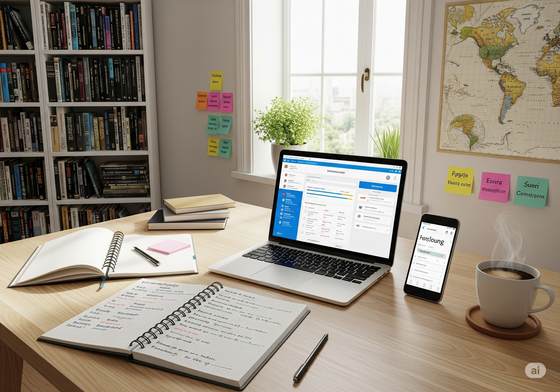How to Learn a Language Fast: 5 Simple Habits
By Admin | Date: August 22, 2025 | Category: Language Learning, Tips | Reading Duration: 6 min

Learning a new language might seem really hard, but it's often more about having good habits than being naturally talented. The best language learners aren't necessarily smarter; they just have smart ways of learning that help them keep getting better. If you want to learn a language faster, try adding these five simple habits to your daily life.
1. Do a Little Bit Every Day (Consistency)
Don't try to study for many hours just once a week. Smart learners spend time with their new language every day, even if it's only for a short time. About 15-30 minutes daily helps you remember words, grammar, and how to speak. You could listen to a podcast on your way to work, look at flashcards during a break, or read a short news article before bed. Small, regular efforts work much better in the long run than big, infrequent study times.
2. Live the Language (Immersion)
Moving to a country where the language is spoken is great for learning, but you can create a similar experience right where you are. Change your phone's language, watch movies with subtitles in your new language, listen to music, read books, and try to find people to talk to online or nearby who speak it. The more you surround yourself with the language, the more naturally you'll learn it.
3. Speak and Write (Active Practice)
Many people spend a lot of time reading and listening but are afraid to speak and write. But actually using the language by speaking and writing is how you really become fluent. Don't worry about making mistakes! Talk with teachers, language exchange partners, or even just to yourself. Write in a journal, try short stories, or join online groups. When you actively try to use words and grammar, it helps your brain learn and remember them better.
4. Learn New Words Smartly (Vocabulary System)
Just seeing a word once isn't enough. Good learners have a plan for how to learn and remember new words. This might mean using apps that show you words again just when you need to review them (like Thoth), keeping a special notebook for new words and how they're used in sentences, or drawing word maps. Try to learn words inside full sentences, not just by themselves, as this helps you use them naturally.
5. Set Clear Goals and Check Your Progress (Goal Setting)
Saying "I want to learn German" is too general. Smart learners set goals that are specific, measurable, achievable, realistic, and time-bound (SMART) . For example: "I will be able to talk for 5 minutes in German about my hobbies by the end of three months." Checking how you're doing regularly keeps you motivated and makes you feel good about your small wins. Celebrate these small successes to keep going!
By adding these five habits to your language learning routine, you'll not only learn faster but also enjoy the process more and stick with it longer. Remember, learning a language is a long journey, not a quick race – doing things often, actively practicing, and using smart plans are your best tools.
⭐ Quick Takeaway ⭐
| Habit | What It Means | Why It Helps |
|---|---|---|
| 1. Consistency | Do a little bit every day (15-30 mins). | Helps your brain remember things better over time. |
| 2. Immersion | Surround yourself with the language (phone, movies, music). | Makes learning feel natural and easy. |
| 3. Active Practice | Speak and write often, don't fear mistakes. | Builds real-world fluency and confidence. |
| 4. Smart Vocabulary | Use apps/notebooks for new words in sentences. | Helps you learn and remember words more effectively. |
| 5. Clear Goals | Set specific, timed goals and check your progress. | Keeps you motivated and shows how far you've come. |




